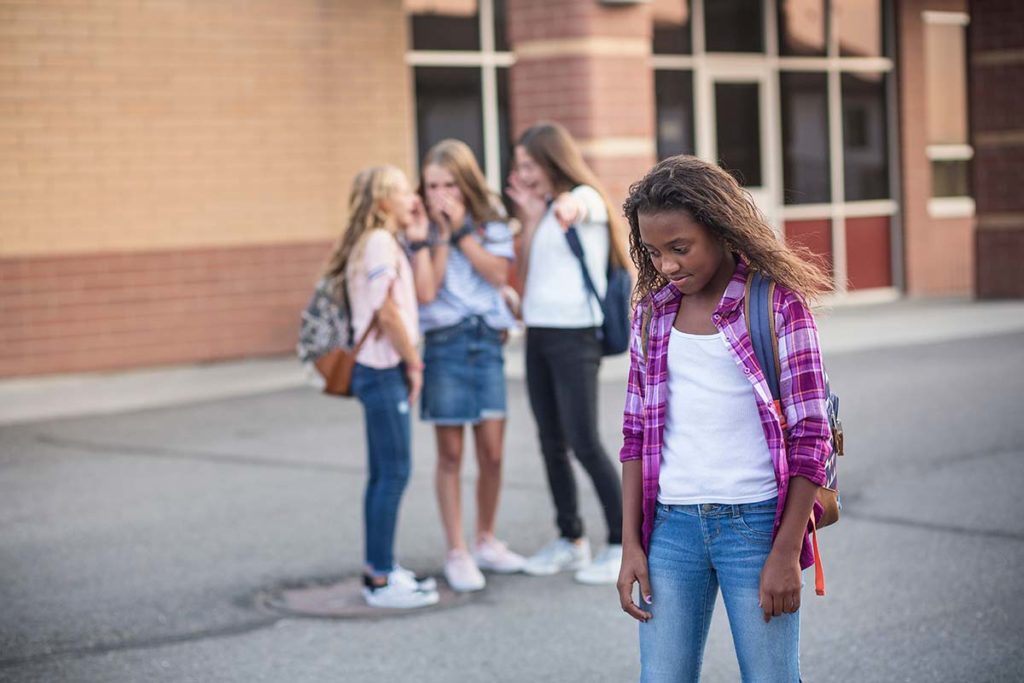It’s not always easy to tell when a teen is struggling with social anxiety. They might seem quiet, withdrawn, or overly self-conscious, but often, there’s more going on beneath the surface. What looks like moodiness or disinterest can actually be a deep fear of being judged, embarrassed, or rejected.
For teens, even everyday situations like answering a question in class, walking into a crowded room, or meeting someone new, can feel overwhelming. And while many teens feel nervous from time to time, social anxiety creates a pattern that starts to interfere with daily life.
In this post, you’ll learn how to spot the signs of social anxiety in your teen, understand where it comes from, and explore practical ways to support them. You’ll also find information on therapy options that can help your teen feel more confident, capable, and connected.
What Is Teen Social Anxiety?
Social anxiety goes beyond shyness or occasional nervousness. For teens, it can feel like a constant fear of being judged, watched, or rejected in everyday social situations. This fear can make things like speaking in class, going to school, or even talking to friends feel overwhelming.
Unlike typical teen self-consciousness, social anxiety gets in the way of daily life. It can lead to avoidance, isolation, and a growing fear of situations that most people consider routine. The pressure to fit in and be accepted makes the teen years especially challenging for someone struggling with social anxiety, according to the National Institute on Health (NIH).
Understanding what it looks like is the first step toward helping your teen feel more supported and less alone.
Signs of Social Anxiety in Teens
Social anxiety in teens doesn’t always stand out right away. It can be quiet, subtle, or mistaken for moodiness or disinterest. But over time, patterns start to show — especially when your teen begins avoiding situations that seem perfectly manageable to others. Recognizing the signs early can help you support your teen before the anxiety starts limiting their everyday life.
Avoiding Social Situations
Teens with social anxiety often go out of their way to avoid situations where they might be noticed, judged, or expected to interact. This could look like skipping school dances, avoiding clubs or sports, or regularly asking to stay home instead of hanging out with friends. You might hear vague excuses or notice a sudden change in how social they used to be.
Fear of Embarrassment or Judgment
This fear goes far beyond normal self-consciousness. Your teen might constantly worry about saying the wrong thing, being laughed at, or being seen as awkward. Even small interactions — like ordering food or walking into a classroom — can feel like high-stakes situations. You may notice them asking for reassurance often or hesitating to try anything new in front of others.
Trouble Speaking Up in Class or Public Settings
Participating in class or speaking in groups is especially hard for teens with social anxiety. They might freeze up, give very short answers, or avoid raising their hand altogether. Presentations can feel almost unbearable. If your teen dreads speaking situations, no matter how low-pressure they seem, it could be more than shyness.
Low Self-Esteem or Harsh Self-Criticism
Social anxiety often comes with a constant inner dialogue of self-doubt. Your teen may second-guess things they said hours ago or assume people are annoyed with them — even when there’s no real evidence. You might hear them call themselves “awkward” or “stupid” after even small social interactions.
Physical Symptoms
Social anxiety isn’t just emotional — it often shows up as real physical discomfort. These symptoms can come on quickly in social settings and may even lead your teen to believe something is physically wrong.
Common physical symptoms include:
- Rapid heartbeat
- Sweating
- Nausea or stomachaches
- Shaking or trembling
- Blushing
- Dizziness or lightheadedness
- Muscle tension
If your teen regularly complains of these symptoms right before or during social events — especially if they avoid talking about why — it may be linked to anxiety.
How Teens Can Develop Social Anxiety
Social anxiety doesn’t come out of nowhere, according to the National Institute of Mental Health (NIMH). It usually builds over time, shaped by a mix of personal experiences, environment, and how a teen processes stress. While each teen is different, understanding some of the common factors can help you spot where the anxiety may be coming from — and what kind of support might help.
Past Experiences of Embarrassment or Rejection
One painful moment — like being laughed at during a presentation, excluded by peers, or publicly corrected by a teacher — can leave a lasting mark. If your teen has felt humiliated or singled out, even once, they may start to associate social situations with that same fear of judgment.
High Expectations or Pressure to Perform
Some teens develop social anxiety after repeatedly feeling like they have to be perfect. This pressure can come from school, extracurriculars, family expectations, or even social media. The fear of messing up or not measuring up can make them overly cautious in any setting where they feel watched.
Bullying or Ongoing Social Conflict
Teens who’ve been bullied — in person or online — often start to expect criticism, even in safe environments. Social anxiety can grow from the belief that others are constantly judging or mocking them, even if that’s not happening anymore.
Shyness That Becomes Avoidance
Being shy is normal, but if a shy teen starts avoiding social situations altogether, it can become a cycle. The more they avoid, the more anxious they feel when they have to interact. Over time, this can turn into full-blown social anxiety that’s hard to break without support.
Family Dynamics and Learned Behavior
Teens often pick up on how the adults around them handle stress. If a parent or caregiver is socially anxious or overly critical, teens may absorb those patterns without realizing it. In some cases, social anxiety runs in families and may have a genetic component.
Underlying Mental Health Conditions
Sometimes social anxiety develops alongside other mental health struggles like generalized anxiety, depression, or ADHD. These conditions can make it harder for teens to feel confident in social situations, especially if they already feel “different” from their peers.
Recognizing where the anxiety may be rooted doesn’t mean assigning blame. It gives you a starting point for better understanding your teen — and figuring out what kind of support will help them feel safer and more confident in social situations.
Ways to Help Your Teen Manage Social Anxiety
You don’t have to solve your teen’s anxiety for them, but you can guide them toward tools and experiences that help them feel more confident. With consistency and support, small steps can lead to meaningful change. Here are a few ways to help your teen manage social anxiety in everyday life.
1. Encourage Gradual Exposure
Avoiding social situations may feel safer in the moment, but it often makes anxiety stronger in the long run. Instead, help your teen face their fears slowly, one step at a time. Start with low-pressure situations — like asking a question in class or chatting with a friend during lunch — and work up to more challenging interactions. Every small success helps build confidence and reduce fear over time.
2. Provide a Safe, Supportive Environment
Make sure your teen knows they can talk to you without being judged or criticized. When they open up about their fears, listen without rushing to fix the problem. Let them know that it’s okay to feel anxious and that you’re proud of them for talking about it. Feeling understood at home gives your teen a foundation of safety that makes it easier to take healthy risks in the outside world.
3. Teach Relaxation Techniques
Physical symptoms of anxiety can be intense, especially in social situations. Help your teen practice calming strategies like deep breathing, progressive muscle relaxation, or short mindfulness exercises. Doing these together during calm moments makes it easier for them to use these tools when anxiety shows up in real time.
4. Model Positive Social Behavior
Teens pay close attention to how adults handle themselves. If you approach social situations with calm, openness, and curiosity, your teen is more likely to do the same. You don’t have to be perfect — even small moments, like making eye contact with a cashier or staying calm during a difficult conversation, show your teen what healthy social interaction can look like.
5. Encourage Professional Support
If social anxiety is keeping your teen from enjoying life, connecting with others, or succeeding at school, it may be time for outside support. A therapist can help your teen understand what’s driving their anxiety and teach them concrete skills to manage it.
Therapies That Can Help with Social Anxiety
If your teen is struggling with social anxiety, therapy can give them the tools and support they need to feel more confident and in control. The right approach depends on your teen’s needs, but several evidence-based therapies have been shown to be especially helpful.
Cognitive Behavioral Therapy (CBT)
CBT is one of the most effective treatments for social anxiety in teens. It helps them identify the thoughts that fuel their anxiety, challenge negative beliefs, and learn healthier ways to respond in social situations. CBT often includes practicing real-life skills, like starting conversations or handling awkward moments, in a safe and structured way.
Exposure Therapy
This approach is often used as part of CBT and focuses on gradually helping your teen face the situations they fear. Starting with lower-stress interactions, like saying hello to a classmate, your teen works up to more challenging scenarios. Over time, exposure helps reduce the fear and avoidance that keep social anxiety going.
Acceptance and Commitment Therapy (ACT)
ACT helps teens accept uncomfortable feelings rather than fighting them. Instead of trying to eliminate anxiety, this therapy focuses on building psychological flexibility — teaching your teen to stay present, act in line with their values, and take small steps even when they feel anxious.
Group Therapy
Group therapy gives teens a chance to connect with others who understand what they’re going through. It’s a supportive space to practice social skills, share experiences, and build confidence in real-time interactions. Many teens with social anxiety feel less alone when they realize others have similar fears.
Family Therapy
If conflict or misunderstanding at home is contributing to your teen’s anxiety, family therapy for anxiety can help. It creates a space for everyone to work on communication, set healthy boundaries, and support each other’s growth. This can make it easier for your teen to practice what they’re learning in therapy.
Help Your Teen Build Confidence That Lasts
If social anxiety is holding your teen back, the right support can make a big difference. At Imagine by Northpoint, we help teens understand their anxiety, build real-life coping skills, and gain the confidence to face social situations without fear. Our programs are designed to support both teens and families in a way that feels safe, personal, and effective.
Contact us today to learn how we can help your teen feel more connected, supported, and ready to move forward.



